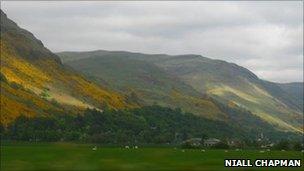Calls to bury Beauly-Denny power line rejected
- Published

Scottish Power have again rejected proposals to bury the line in the Stirling area
Scottish Power has again rejected to calls to bury the Beauly-Denny power line in the area around Stirling.
The company was asked by the Scottish government in March to consider "unexplored options" to mitigate the visual impact of the line.
But Scottish Power has repeated its position that undergrounding would be too expensive, lead to delays and have "limited environmental benefits".
Anti-pylon campaigners have called the response "farcical".
Ministers approved the 440kv power line upgrade in January 2010. It will consist of a network of 600 pylons and connect renewable power generated in the north of Scotland to the national grid.
When it gave permission for the project, the Scottish government asked Scottish Power to draw up plans to limit the visual impact of the power line.
There was fierce opposition to the initial mitigation proposals for Stirling - which included painting the towers a darker shade and planting greenery to screen them - and the then Energy Minister Jim Mather told the company to look again at burying the line.
'Three-year delay'
Scottish Power said 23 options to reduce the visual impact of the pylons had been considered.
But the company said that burying the main high power line would lead to a delay of up to three years and generate "significant" costs that would have to be passed onto consumers.
"The evaluation concluded that any undergrounding of the main 400kV line cannot be justified on the grounds of cost, technical difficulties and very limited environmental benefits," its report said.
"The company is therefore proposing to undertake extensive screen planting and hard and soft landscaping works and to underground a further 4.6 km of wood pole overhead lines, which could bring the total amount of other overhead lines being undergrounded to 11km."
Frank Mitchell, chief executive officer of Scottish Power said the company had considered every option available "in depth".
The company is responsible for a 12-mile (20km) stretch of the power line in the Stirling and Falkirk areas.
Mitigation measures for other parts of the 137-mile (220km) line, which will run from near Inverness to the Falkirk area, were agreed in October 2010.
"We believe that the revised Stirling visual impact mitigation scheme meets the terms of the condition placed on this project by the Scottish government last year, and also fully reflects the outcome of the further process of engagement with Stirling Council," Mr Mitchell said.
"On this basis, Scottish Power looks forward to a positive early response to the scheme in order that further delays in delivering this project of national importance can be avoided."
But anti-pylon campaigners have hit out at the energy company's response as "feeble" and "farcical".
'Serious questions'
Caroline Paterson, from Stirling Before Pylons, told BBC Scotland that if Scottish Power had listened a few years ago, the line would already be up and running.
"Maybe it will take slightly longer to underground at this stage. But Scottish Power have resisted and resisted all along. Obviously that does cost, but it's of their own making," she said.
"I think there are serious questions to be asked if the Scottish government approve it with no changes. They asked for changes and they've not happened."
Mrs Paterson added: "The Scottish government was elected to represent the people and if it bows to this, you have to ask who is running the country. Is it the power companies?"
Labour MP for Stirling Anne McGuire accused SNP ministers of "cynically" misleading campaigners into believing radical changes to the line could be made.
"I am deeply disappointed but quite frankly not surprised that the views of my constituents that I have represented over the years have been utterly dismissed," she said.
A spokesman for the Scottish government said ministers would make a decision on Scottish Power's latest proposals after consulting with Stirling Council.
- Published8 March 2011
- Published23 November 2010
- Published29 October 2010
- Published25 October 2010
- Published29 September 2010